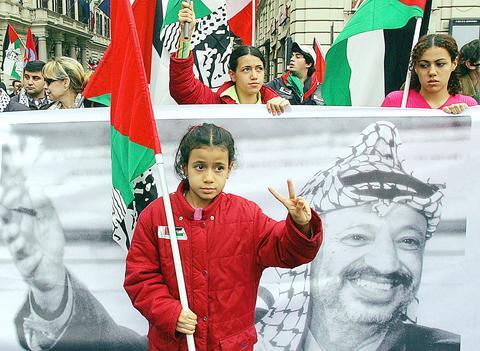At the request of the Bush administration, Israeli Prime Minister Ariel Sharon has agreed to consider removing Israeli security forces from Palestinian areas to facilitate Palestinian elections in the next two months, The New York Times reported yesterday.
Israel has serious misgivings about the proposal but is willing to envisage it under certain conditions, such as if Palestinian forces are mobilized in place of Israeli forces, an official close to the talks told the Times.

PHOTO: AFP
"When it comes to implementing the decision to have elections in 60 days, the question arises of what you do with the IDF [Israeli Defense Forces]," the official said.
"You want freedom of movement for the Palestinians, but you have to make sure that nothing is done that costs Israeli lives."
A US official told the paper that Washington was concerned about the difficulty of holding elections for a successor to Palestinian leader Yasser Arafat in the present circumstances.
"How do you conduct elections in 60 days if the Israelis are still all over Gaza and areas of the West Bank?" the official said. "That's been a question we've started to have to think about."
During Arafat's illness and since his death last week, Washington has quietly been urging Israel to help strengthen the standing of Palestinian moderates, ahead of the vote for a new Palestinian leader, the Times said.
Last weekend, Israel released US$40 million in frozen tax funds to the Palestinian Authority, after long resisting the move, the Times said, citing US and Israeli officials.
"The White House and Sharon's office are also discussing other steps to facilitate the elections that are points of dispute between Israel and the Palestinians," the daily said. These include Israeli reluctance to allow Palestinians in the Jerusalem area to vote.
Neither side has said much about the talks for political reasons. Israel does not want to be seen as yielding to US pressure, and President George W. Bush has been reluctant to be seen as pressuring Israel for concessions.
Bush and his principal European ally, British Prime Minister Tony Blair, on Friday pledged to do "whatever it takes" to secure peace between Israeli and the Palestinians, as Palestinians laid Arafat to rest in Ramallah and observers said his death could open the way for peace.
"I believe we've got a great chance to establish a Palestinian state. I would like to see it done in four years. I think it is possible," Bush declared at a joint press conference with Blair after a White House summit.
Bush and Blair outlined a five-point strategy committing to the two-state vision for Israel and a Palestinian state and promising to support Palestinians as they select a new president within 60 days.
They pledged to mobilize the international community for a stronger economy and security in a Palestinian state, endorsed Prime Minister Ariel Sharon's plan to withdraw Israeli settlements from Gaza, and claimed these steps would "lay the basis for more rapid progress" on the roadmap to Middle East peace.
After the two leaders spoke, State Department officials said the US was looking at a new round of diplomacy, including a Middle East trip by Secretary of State Colin Powell, to revive the peace process.

PRECARIOUS RELATIONS: Commentators in Saudi Arabia accuse the UAE of growing too bold, backing forces at odds with Saudi interests in various conflicts A Saudi Arabian media campaign targeting the United Arab Emirates (UAE) has deepened the Gulf’s worst row in years, stoking fears of a damaging fall-out in the financial heart of the Middle East. Fiery accusations of rights abuses and betrayal have circulated for weeks in state-run and social media after a brief conflict in Yemen, where Saudi airstrikes quelled an offensive by UAE-backed separatists. The United Arab Emirates is “investing in chaos and supporting secessionists” from Libya to Yemen and the Horn of Africa, Saudi Arabia’s al-Ekhbariya TV charged in a report this week. Such invective has been unheard of

US President Donald Trump on Saturday warned Canada that if it concludes a trade deal with China, he would impose a 100 percent tariff on all goods coming over the border. Relations between the US and its northern neighbor have been rocky since Trump returned to the White House a year ago, with spats over trade and Canadian Prime Minister Mark Carney decrying a “rupture” in the US-led global order. During a visit to Beijing earlier this month, Carney hailed a “new strategic partnership” with China that resulted in a “preliminary, but landmark trade agreement” to reduce tariffs — but

Chinese President Xi Jinping’s (習近平) purge of his most senior general is driven by his effort to both secure “total control” of his military and root out corruption, US Ambassador to China David Perdue said told Bloomberg Television yesterday. The probe into Zhang Youxia (張又俠), Xi’s second-in-command, announced over the weekend, is a “major development,” Perdue said, citing the family connections the vice chair of China’s apex military commission has with Xi. Chinese authorities said Zhang was being investigated for suspected serious discipline and law violations, without disclosing further details. “I take him at his word that there’s a corruption effort under

China executed 11 people linked to Myanmar criminal gangs, including “key members” of telecom scam operations, state media reported yesterday, as Beijing toughens its response to the sprawling, transnational industry. Fraud compounds where scammers lure Internet users into fake romantic relationships and cryptocurrency investments have flourished across Southeast Asia, including in Myanmar. Initially largely targeting Chinese speakers, the criminal groups behind the compounds have expanded operations into multiple languages to steal from victims around the world. Those conducting the scams are sometimes willing con artists, and other times trafficked foreign nationals forced to work. In the past few years, Beijing has stepped up cooperation